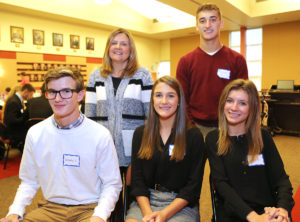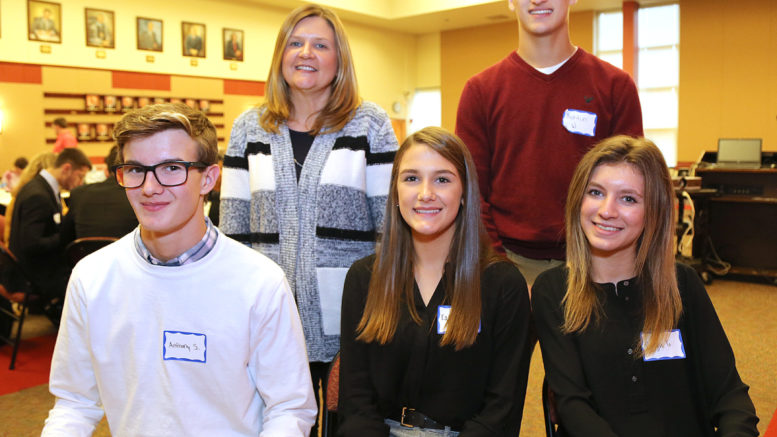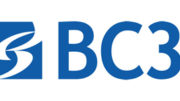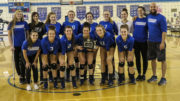Students at Lincoln High School in Ellwood City recently participated in Butler County Community College’s Entrepreneurship Challenge, which drew students from nine high schools in six counties to BC3’s main campus in Butler Township.
Anthony Spadafore, Ashton Wilson, Katelyn Wehman and Bryn Gray, accompanied by teacher Cindie Friello pitched a business plan called Foundation of Advancements in Youth Academics – which would focus on progressing student education – in the Entrepreneurship Challenge that took place earlier this month.
Junior students from Seneca Valley won the BC3 Entrepreneurship Challenge on November 5th with a plan to create a subscription service that would deliver to classmates a Raider Crate containing items that promote school spirit, and coupon packets to alert students of area businesses – and with proceeds providing soap and other essentials to students in underfunded schools.
Six judges assembled by BC3’s Center for Economic Education considered 15-minute business plan presentations by teams representing nine high schools before awarding first place to Seneca Valley’s Antonio Amelio, Connor Anderson, Brianna Buccini, Vibha Hodachalli, Sydney McMurray and Zach Garcia.

Seated, from left, Anthony Spadafore, Katelyn Wehman and Bryn Gray. Standing, from left, teacher Cindie Friello and student Ashton Wilson.
Seneca Valley’s business plan was also voted best by BC3 Entrepreneurship Challenge competitors from Ellwood City, Farrell, Freeport, Fort Cherry, Jamestown, Lakeview, Penns Manor and Punxsutawney high schools.
“An actual, feasible business”
The BC3 Entrepreneurship Challenge teaches students the basics of starting a business, said David Huseman, a professor of humanities and social sciences at BC3 and the director of the college’s Center for Economic Education, which promotes financial literacy for those in kindergarten through 12th grade.
Students were judged on factors such as the creativity of their business plan, the effectiveness of their introductory speech, and their ability to identify the competitive advantage their business would have, Huseman said.
“They also need to explain how the business will satisfy a particular need,” Huseman said, “and describe their target market in terms of customers and demographics, and the size of the market to make sure there are enough customers to make the business successful.”
Raider Crate, whose business plan forecasts 100 subscriptions within three years, also appealed to judges because its profits would benefit Starts with Soap, according to Jessica Spanogle, an instructor at Mercyhurst University, Erie, and a BC3 Entrepreneurship Challenge judge.
“It’s a well-established charity, and they were all very adamant that they weren’t going to take their share, their cut of the profits of the business,” Spanogle said.
Raider Crate would donate its proceeds to Starts with Soap “so that students only have to worry about their learning, and not where to wash their hands,” according to the Raider Crate business plan.
“The other thing is,” Spanogle said, “(Raider Crate) is an actual, feasible business that they plan to launch.”
Seneca Valley’s team will apply the $250 it received as the BC3 Entrepreneurship Challenge winner to buy its first products and launch Raider Crate, possibly by December, Garcia said.
“We’re getting real-world experience”
Those products, available for a three-box subscription of $45, could include “items that students may need in their day,” Seneca Valley’s Vibha Hodachalli said, “or items they would like to have.”
Scrunchies, bracelets, hats, socks, lanyards, coffee mugs, sweatbands, keychains and school supplies – “personalized with our school’s logo,” Hodachalli said, may be included in a Raider Crate, as well as gum, mints, candies and coupon packets to area businesses.
Christian Waronsky, a Freeport High junior, won second place with his idea for Cut Kicks, which would sell pre-customized shoes or customize shoes customers already own.
Brady Schall, Alex Martin and Josh States, Punxsutawney High students, won third place for their idea for Min Vac Pac, a device that would gather shavings from an eraser and create a new one.
The competition culminates one month of preparation by students since they met in early October with Spanogle at BC3 to learn how to write a business plan, Huseman said – and provided motivation to his students, according to Seneca Valley teacher Dean Walker.
“They would not be where they are, would not have been driven to plan so far into this idea if they didn’t have the incentives that this program offered,” Walker said. “Now I think they are going to execute the idea because they are so invested in the time and effort that they put in because of the Entrepreneurship Challenge at BC3.”
Added Seneca Valley student Connor Anderson: “We’re getting real-world experience. And this was an opportunity for us to come and get funding so we can actually do this.”
Entrepreneurship Challenge “is an opportunity”
Lora Spence, an economic education consultant and retired University of Pittsburgh professor who served as a BC3 Entrepreneurship Challenge judge, said the competition is unique and represents “a global education for the students.”
“They learn so much more than they would in the classroom,” Spence said. “They are going to use the things they’ve learned here in their lives.”
The BC3 Entrepreneurship Challenge, Seneca Valley’s McMurray said, “is an opportunity I wouldn’t have been afforded if there weren’t competitions like this. There is a lot more work that goes into a business than people usually think. But it is definitely attainable. Even for young people like us.”
Judges for the BC3 Entrepreneurship Challenge also included Charles Stitt, an independent consultant; William Fraser, former owner of Butler area automobile dealerships; Mark Klopfer, adjunct faculty at BC3 and owner of Stadium Solutions; and James Hrabosky, vice president for administration and finance at BC3.
Students pitch variety of business plans
Students from Jamestown High, Mercer County, with a business plan called The Clean Machine – a touch-screen dispensary for laundry detergents – were Darren Dudley, Daniel Parks, Mandi College, Chase McLaughlin and Mitchell Headley, accompanied by teacher Heidi Grinnel.
Students from Farrell High, Mercer County, with a business plan called Help Me Grow – an app that would help troubled individuals who want to achieve or identify their goals – were DeMariah Burns, D’Eryah Stewart and Cyncere Harden-Mann, accompanied by teacher Leigh Phanco.
Students from Lakeview High, Mercer County, with a business plan called Just A.S.K. by Aubrey, Sarah, Kathryne – which would use paper and a decoupage medium to create customized, decorative signs – were Aubrey Martin, Sarah Ryhal and Kathryne Stull, accompanied by teacher Marie Kohr.
Students from Lincoln High, Ellwood City, Lawrence County, with a business plan called Foundation of Advancements in Youth Academics – which would focus on progressing student education – were Anthony Spadafore, Ashton Wilson, Katelyn Wehman and Bryn Gray, accompanied by teacher Cindie Friello.
Students from Fort Cherry High, Washington County, with a business plan called RoboTub – a device that would clean a bathtub with three of the company’s detergents with different scents – were Matt Lacek, Austin Hanna, Jacob Ross and Ben Jones, accompanied by teacher Jodie Kioalicas.
Students from Penns Manor High, Indiana County, with a business plan called MKG Veterinary Hospital and Boarding, a 24-hour facility for all animals except exotic creatures – were Megan Ruffner, Megan Schwartz and Gabriel Riva, accompanied by teacher Dan Antonacci.
Cut Kicks received $200 as the second-place team in BC3’s Entrepreneurship Challenge and Min Vac Pac, $150 as the third-place team.
Teachers Brieana Nassan, of Seneca Valley; Dana Roach, of Freeport; and Jesse Hockenberry, of Punxsutawney, also attended.
The Center for Economic Education is supported by the BC3 Education Foundation and by private donations. It also coordinates 24-week and 12-week Stock Market Games in which students receive a hypothetical $100,000, make buy-and-trade decisions and track how those decisions would have played out in the markets had they been real.
More than 105 teams from Freeport, Lakeview, Moniteau and Seneca Valley school districts are competing in the 24-week game and more than 110 squads from Butler, Knoch, Mars, Mercer and Union school districts are competing in the fall semester’s 12-week game.






Be the first to comment on "LHS Students Participate In BC3 Entrepreneurship Challenge"